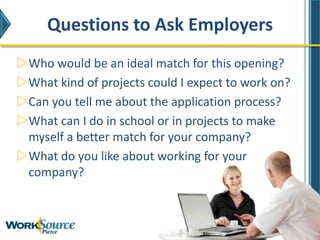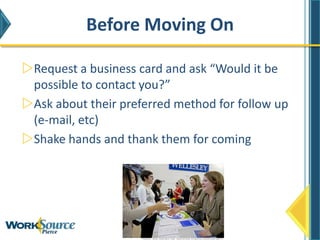How to Work a Job Fair!
- 1. How to Work a Job Fair …and make it work for you!
- 2. Outline 1. Why attend a job fair? 2. Why do employers attend? 3. What to expect 4. How to prepare 5. Plan of attach 6. Follow-up
- 3. Why Attend a Job Fair?? Learn about specific employers & their application processes Explore career options & research areas of interest Establish contact with employers-Network Practice your interviewing skills Apply for jobs & internships Get free stuff!!
- 4. Why Do Employers Attend? 97% provide job openings & company information to solicit applicants & maintain visibility 84% discuss company benefits Scout for talent, skill & “fit” for their companies
- 5. What to Expect Vary in size and number of employers Employers stand/sit at tables often with displays or booths Can have a wide range of companies, start- ups, enterprises, staffing agencies, training providers, and career counselors Some employers might interview on the spot, but most will refer to online application
- 6. Well-known employers will have lines Very noisy, crowded and warm What to Expect
- 7. BEFORE THE EVENT How to Work a Job Fair
- 8. Decide What You Want Have reasonable expectations Decide what you want to get out of the fair – Learn about specific employers? – Explore career options – Make one-on-one contact with key connections – Research demand for your skills – Practice interview skills in informal setting
- 9. Preparation and Research Why is this important? Being informed makes you more confident If you know about employers at the fair, you can clearly articulate how you are a good fit
- 10. Researching employers: Type of organization, business or agency Mission statement & core values Reputation Recent news and articles New programs, plans, challenges, etc. Preparation and Research
- 11. Where Can I Get Info? Company websites LinkedIn Company Page Facebook/Twitter pages Puget Sound Business Journal / WSJ Dun & Bradstreet
- 12. Before You Go Organize your materials a. Bring at least 25 resumes b. Have TARGETED resumes c. Do you have business cards? d. Have a notebook to keep resumes, business cards and employer information e. Have a list of questions for employers and take notes!
- 13. Before You Go Prepare Yourself! a. Have a personal summary ready b. Prepare to interview (just in case!) c. Obtain most current employer list and find relevant job openings– target your preparations to those openings d. Know what you’ll wear e. Review online applications in advance, note any questions on process you may have to ask recruiters
- 14. DURING THE EVENT How to Work a Job Fair
- 15. What to Wear? Dress professionally – Business suits make the best impression – Business Casual is acceptable Wear comfortable shoes! Because of crowds, leave backpacks home Be prepared for weather– you may have to park a ways away
- 16. Have a Strategy Research ahead of time if you can Have 4-5 employers targeted to speak to Obtain an event map (if available) Prepare for lines– most popular employers will likely have long lines Be alert to other conversations– you’ll learn something!
- 17. Meeting Recruiters Typical time spent with recruiter is 1-3 minutes Give a brief (30-60 seconds) personal introduction Explain how your background & strengths match their needs Offer your resume Be sincere Be professional!
- 18. Your Personal Introduction Name, background, 2-3 skills or strengths that match the company’s needs Show passion for what you do Highlight a relevant accomplishment Have a question ready to ask employers (remember time constraints)
- 19. Questions to Ask Employers Who would be an ideal match for this opening? What kind of projects could I expect to work on? Can you tell me about the application process? What can I do in school or in projects to make myself a better match for your company? What do you like about working for your company?
- 20. Before Moving On Request a business card and ask “Would it be possible to contact you?” Ask about their preferred method for follow up (e-mail, etc) Shake hands and thank them for coming
- 21. After Meeting Your Target Employers Track which employers you submitted resumes to– jot down notes from each employer “Shop” other employers’ booths and do some networking If there are associated workshops or presentations, plan on attending Remember that job fairs are just as much about networking opportunities as they are about jobs!
- 22. AFTER THE EVENT How to Work a Job Fair
- 23. After the Job Fair If you did not do research before the Job Fair, do so before submitting your application Send a thank you note that affirms your interest Submit your TARGETED application or resume following company procedures Stay in touch periodically, IE: sending them your updated qualifications Employers do expect follow-up The point is to stay Top of Mind– but don’t become a nuisance!























